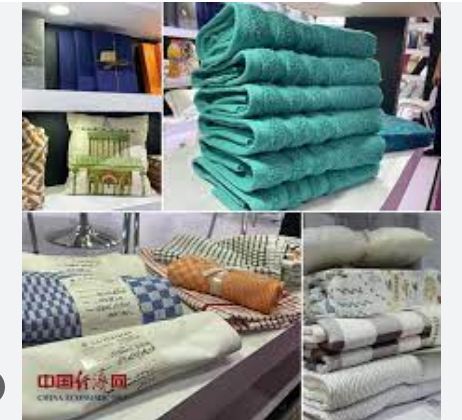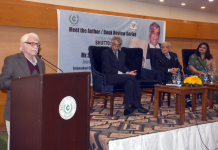BEIJING, May 6: Pakistani textile merchants carved out a niche at Canton Fair, China Economic Net (CEN) reported on Saturday.
“Business is good this time. Our trade volume may reach $1 million for this phase,” said Gauhar Mustafa, Owner, Gohar Textile Mills Pvt Ltd., Pakistan, at the 133rd China Import and Export Fair held in Guangzhou, China.
The 133rd China Import and Export Fair, also known as the Canton Fair, concluded its third and final phase in Guangzhou, China on May 5. Over the past five days, textiles, fabrics and clothes were showcased alongside other products to international buyers.
It is Mustafa’s 5th time attending the fair. This year he had sustainable, recyclable home textiles with him. “We are getting many customers worldwide,” he pointed out, adding that as China’s epidemic prevention and control has entered a new stage, it is easier for international traders like him to travel back and forth, and trade delegations find it better to fortify ties with their partners and peers and explore new opportunities.
For Tayyab Rasheed, Director Marketing (Towel Division), A.I. Textiles, Pakistan, the story is even longer. It is his 7th time here.
The textile sector in Pakistan has an overwhelming impact on the economy, contributing 60% to the country’s exports. In today’s highly competitive global environment, the textile sector needs to upgrade its supply chain, improve productivity, and maximize value-addition to be able to survive.
However, Pakistan’s textile group exports declined by 14.2 percent during the first 10 months (July-April) of the current fiscal year 2022-23 (FY23) and stood at $13.71 billion as compared to $15.97 billion during the same period last year, according to data released by All Pakistan Textile Manufacturers Association (APTMA) on May 2.
Standing out today as a leading manufacturer of quality Greige, fabric & made ups for home and institutional textile sectors across the globe, the company attracted buyers from different countries.
Rasheed told China Economic Net that some Chinese companies visited their booth, expressing willingness to deepen trade ties with the company as they offer fair price and fine quality at the same time.
“They also want to explore the Pakistani market. We hope that China and Pakistan can do more business and cooperate more with each other,” he further said.
As Rasheed put it, the textile sector in Pakistan has its competitiveness. “Our industry is expanding – Pakistan produces its own cotton; now it has a state of the art machinery imported from Europe, China and so on; our labor cost is less than some other countries in Asia; therefore, we have edges to sell our quality products at cheaper prices.”
“I’m here to sell my products and I’m here to represent my country Pakistan,” he said proudly. He told the reporter that before they got many orders, many customers from this fair. And this time, “Hopefully we will increase our sales with the whole world.”
Launched in 1957 and held twice yearly, Canton Fair is considered a major gauge of China’s foreign trade. This year’s fair resumed all on-site activities in Guangzhou, after being held largely online since 2020 due to COVID-19 prevention measures.
The on-site activities of the 133rd Canton Fair occupied an area of 1.5 million square meters, with 35,000 companies participating offline and foot traffic exceeding 2.9 million people.
All figures set new records. During the offline exhibitions, export deals worth a total of $21.69 billion were signed, which was better than expected, according to fair spokesperson Xu Bing.
The event attracted overseas buyers from more than 220 countries and regions either online or offline. Nearly 130,000 buyers attended the offline exhibitions, with approximately half coming from countries along the Belt and Road.

















